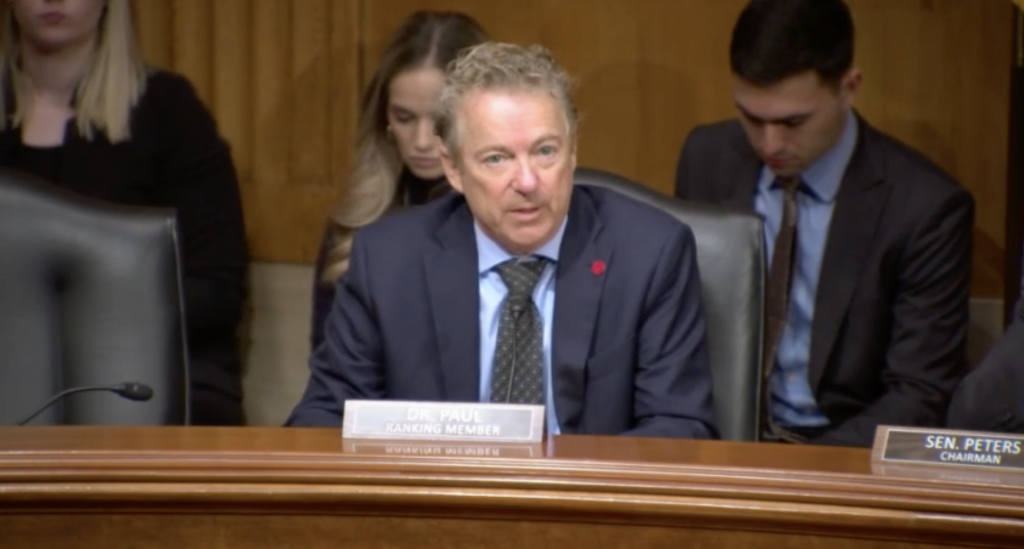WASHINGTON, D.C. – Today, U.S. Senator Rand Paul (R-KY), Ranking Member of the Senate Homeland Security and Governmental Affairs Committee, outlined the need to remove burdensome regulations in the drug manufacturing industry at a full committee hearing titled “Drug Shortage Health and National Security Risks: Underlying Causes and Needed Reforms.”
Dr. Paul discussed the impacts central planning and price control policies have had on drug shortages and the affordability of lifesaving medicine. Costly regulations and concentrated oversight power from the FDA, for example, have increased the cost of production and limited manufacturers’ ability to adapt to increased demands, resulting in artificially high drug prices and drug shortages for patients across the country. This has forced doctors to ration critical medicine and has left patients’ illness worsening and prolonging.
He stated that in a capitalist country, the signal that is given to everyone who manufacturers something is the price, and the medical marketplace should act the same. Regulations and the lack of incentives impede the ability of the markets to thrive and resolve critical drug shortages. Americans across the country facing critical medical challenges should not deal with not having the necessary drugs to survive, and it is vital government creates polices to allow life-saving medicine to be reliable, affordable, and available.

View the Ranking Member’s opening statement here, part one of his questioning here and part two here.
Opening remarks as prepared can be found below:
Ever wonder why we never have shortages of IPhones or computers? What separates the drug industry from the computer or smartphone industries? Computers and smartphones, like drugs, are highly technical and globalized industries, yet there are seldom shortages in any of those industries.
However, unlike the computer, automobile, or smartphone industry, the needs addressed by the drug manufacturing industry are often a matter of life and death.
This is why the decisions of policy makers and regulators are of utmost importance. Rules and regulations that inhibit the production of drugs will create pain for hospitals and patients.
The Food and Drug Administration recently identified a shortage of over 120 different drugs. Some of these drugs, such as saline, are necessary for the most basic of treatments.
These shortages are not a new phenomenon. Since 2007, the FDA identified an average of over 100 separate drug shortages per year. In 2011, the FDA identified a whopping 267 drugs in short supply. Despite possessing the most innovative medical industry in the world, the U.S. is unable to maintain a consistent supply of the most crucial medicines.
While many blame these shortages on foreign producers, so-called “greedy” pharmaceutical companies, and even hospitals, it is no coincidence that the rise in drug shortages correlates with the expanded regulatory reach of the FDA.
Drug shortages force doctors to consider rationing medicines and postponing essential procedures and force patients to needlessly suffer.
While our nation’s hospitals have trouble purchasing the necessary amounts of drugs for cancer patients, heart attack victims, and those in chronic pain, these same hospitals find no such shortage when purchasing computers. Doctors and nurses do not have to cope with a smartphone shortage. The key difference between these industries and the drug manufacturing industry is obvious. The companies producing computers and smartphones are, by comparison, left to compete with one another with little manipulation from government, while the FDA places the heavy yoke of regulation on drug manufacturing.
Over 40 years ago, Milton Friedman remarked, “If you put the federal government in charge of the Sahara Dessert, in five years there’d be a shortage of sand.” While Friedman was discussing price controls and output restrictions on oil and gas production in Dubai, the same wisdom still holds for the drug industry.
The drug industry is one of the most regulated markets in the economy. Output controls, such as FDAs approval procedure for nearly every step of the manufacturing process, increase the cost of production and restrain the adaptability of manufacturers to meet shifting demands. For example, if a drug maker closes, the remaining manufacturers, which must react to increased demand, are forced to seek FDA approval to produce more than the originally approved amount or to produce quicker than the originally approved timeline.
Why does the United States embrace central planning in healthcare? Central planning produced shortages of even the most basic consumer goods in communist countries during the Cold War. There is a famous Soviet quip about a man entering a shop and asking the clerk, “You don’t have any meat?” The clerk says, “No, here we don’t have any fish. The shop that doesn’t have any meat is across the street.”
We should not tolerate central planning in a capitalist country for the most essential products on the market. Further abandoning the principles of basic economics, CMS price controls, such as requiring drug companies to pay rebates to Medicare if they raise their prices too quickly, create even more barriers to entry, which prevent competitors from arising in the market. Limiting the amount of drug producers results in artificially high prices and drug shortages.
Americans will be healthier and live longer if their government allows innovators to provide better drugs, at affordable prices, and produce a strong supply. I hope this hearing will identify the regulations that impede the ability of markets to do what they do best – provide for the consumer. I look forward to hearing our witnesses’ testimonies.
###